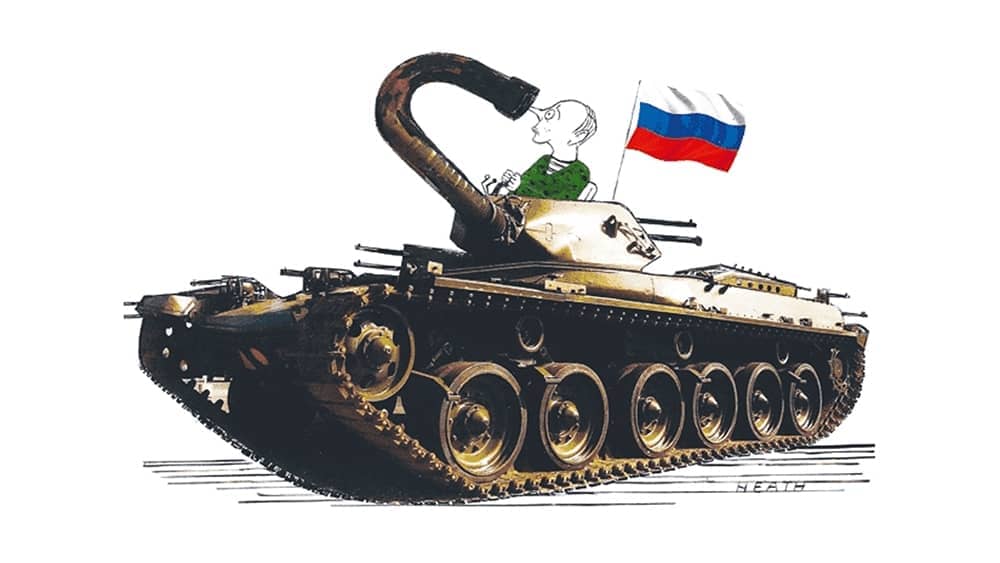I think Putin will have been surprised. I mean: I was surprised. Weren’t you? Not, necessarily, that Ukraine should have been resisting as valiantly as it is; nor even that Russia’s supposedly unstoppable war machine should have found itself out of petrol on a chilly highway from which the road signs have been removed. But surprised by the sheer force and volume and unanimity of the international cry of: no, this will not stand.
That is one thing, even amid the unspeakable human cost of the war in Ukraine, to feel encouraged by. If this invasion does, as many have said, mark the beginning of a new order in European security and great power politics, isn’t it a sign that it could be a stronger, better, less complacent one?
Putin, it seems, expected a short, decisive expeditionary war. He expected Ukraine to collapse, its leadership to be decapitated and a client regime installed. And he expected that — as when he nibbled at the Donbas and Crimea, as when he waged his bloody war in Chechnya, as when he had the gall to poison his enemies on UK soil — the western powers would tut and grumble and bitch but, eventually, throw up their hands and return to business as usual.
Putin’s regime has placed itself outside the pale of civilisation
He will have seen the West as many have come to see it: soft, decadent, comfortable with its consumer luxuries and riven by the narcissism of small differences. He’ll have seen us bickering over regulatory regimes and fishing quotas, running down our armed forces, and substituting Lilliputian culture-wars tit-for-tat for substantial political argument. He’ll have thought, I guess, that the basic principles of liberal democracy aren’t anything anyone really gets ventilated about any more.
Well, up to a point — and he has discovered by ill-thought-out experiment where that point is. A kleptocratic dictatorship, with a frosting of pseudo-mystical blood-and-soil Slavic nationalism, has launched an unprovoked attack on a sovereign democratic state — and the democratic West found its backbone. Turns out that’s where the line is.
There’s a good case to say that it shouldn’t have got this far; that the West has muddled by and equivocated for too long, has been too keen to let money talk and might make right. There’s a case to say that the line shouldn’t have had to have been drawn here. But aren’t you heartened that, at least, the line exists? That when it comes down to it, we aren’t prepared to concede the rules-based international order with a cynical shrug? That we still think there are some things more important than cheap oil?
Short of committing Nato troops to Ukraine’s defence — on the grounds that Nato formally declaring war on a nuclear power might not end well — the unity of the western response has indicated that national sovereignty, self-determination and the rule of law aren’t just slogans.
It took a day or two for that seriousness to assert itself; a day or two, maybe, to really clock that this was the real thing. There was our hesitant first bite at sanctions, the havering over a Swift ban, and Germany’s initial reluctance to break its postwar moratorium on lethal aid; while hashtag warriors in the UK spent their energies using Ukraine’s abject tragedy to score points off each other about Jeremy Corbyn. But presently, first slowly and then quickly, we woke up. Russia came to see how far out on a limb it is. Isolation from the global financial system, most of Europe’s airspace closed to Russian planes, mass disinvestment from Russian companies, multilateral action against its organs of state propaganda, moves to strengthen Nato’s eastern flank and affirm the security of eastern European allies — and donated weapons flowing into Ukraine by the thousand from the US, Sweden, the UK and Germany.
Even those from whom Putin would have expected complicity have turned their backs on him. China abstains at the UN. The Kazakhs refuse to send support. Turkey and Hungary stand by Ukraine, the former apparently limbering up to close the Black Sea to his warships. Putin’s regime has placed itself outside the pale of civilisation. Even if he wins a military victory here — and there’s still every reason to fear that he will — it’s impossible to see how it will be anything other than a Pyrrhic one.
This isn’t just a matter of international policy. It’s there in the information war that Russia is so abjectly losing, in the countless gestures of solidarity with Ukraine across the free world, and in the concrete offers of help, from private donations for aid and military supplies to the people driving across Europe to the Polish border to give assistance to refugees.
And it’s there above all in the ordinary Ukrainians who are taking up arms in defence of their country. It’s there in the exuberant two-fingered salute that they’re giving to the sullen tyrant in the Kremlin even as they stand to lose everything: the “go f— yourselves” of the garrison on Snake Island; the taunting propaganda memes; the old woman urging a Russian conscript to put sunflower seeds in his pocket so they grow in Ukraine’s soil when he’s killed; the hackers rickrolling Russian forces radio with Ukrainian folk songs; the motorists mocking the crews of broken-down tanks; the farmers towing Russian APCs away behind their tractors.
It’s bravery such as we can only watch in awe. But it also looks like the shining moral clarity that comes from saying: this is something absolutely worth fighting for.







Comments